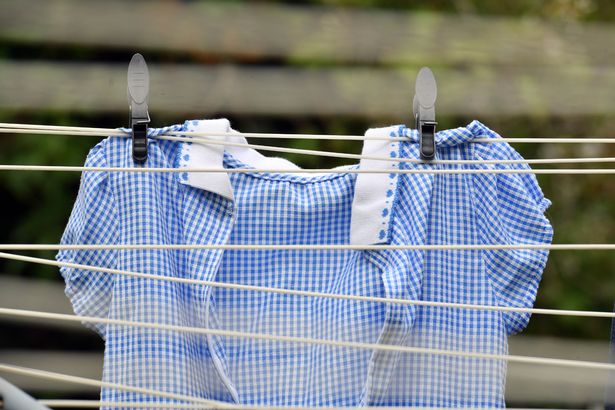When it comes to living frugally, our grandparents and parents could really teach us a thing or two.
As the cost of living crisis takes hold, many families are experiencing for the first time not being able to afford what they want when they want it, and it can be a hard lesson to learn.
Many conversations have been had over the last few months about the differences between how we live now and how older generations lived then, and while no-one would advocate going back to the days of post-war austerity or the power shortages of the 1970s, there’s lots to be said for cutting back and living on as little as possible.
Read more: Washington factory working flat out as families make do and mend
‘You shouldn’t have to do this in 2022’ has become one of the most-used phrases on the internet on discussions about cutting back, but is it really so much hardship not to have your heating on in May or not to use the tumble dryer? After all, as our grandparents would say, they managed.
Waste not want not is one of the fundamental tenets of frugal living, and can be applied to food, water, energy, clothing and practically everything else. We’ve compiled a list of old-fashioned moneysavers below – how many do you do already?

(Image: WalesOnline/ Rob Browne)
Waste Not, Want Not
Wear warm clothes: Wear a jumper in the house rather than turning on the heating – your gran wouldn’t have dreamt of wearing a T-shirt in the winter. If you’re sitting down, use a blanket for an extra layer.
Use lids on saucepans: The water comes to the boil quicker and the food inside them cooks quicker too. Plus you’ll have less steam in your kitchen, which can lead to condensation and mould.
Get your washing on the line: Your dryer is one of the biggest users of electricity in your house. Luckily, it is one of the appliances that can easily be replaced with a little effort.
Have a washing day: Maybe not literally, but try to ensure you only wash full loads, not bits and bobs throughout the week.
Spot-clean clothes: If there’s just a couple of marks on a school sweatshirt, try to rub them off with a damp cloth before automatically throwing it in the wash.
Batch cook: If you’re putting the oven on, try to fill it to maximise the energy use. Whipping up a batch of scones – as recommended in old Bero recipes books – might not be your thing, but shoving a few potatoes in there can give you microwaveable lunches for a week if you refrigerate – or even freeze – them and then reheat when needed.
Turn off the water: Not fuel exactly, but in the same vein. Don’t clean your teeth, wash your hands or do the dishes with the water running constantly. Try filling a bowl or basin with water at the sink and try to shorten your showers.
Make do and mend
Borrow rather than buy: Ask around if you need something for a short time or just for one job. Your friends and neighbours might have just what you are looking for.
Repair, don’t replace: Before you throw away your washing machine or cooker and buy a new one, see if it can be repaired. It is pretty much always less expensive, and appliances can often run perfectly well for many more years. Plus it’s better for the environment and gives work to local businesses.
Cut up old clothes: Instead of spending money week after week on paper towels, use rags whenever you can. Old clothes and old towels make great rags for cleaning.
Fix old furniture: While old furniture might not be to your taste, you can paint it, reupholster it, or just live with it. Grandma certainly would have lived with a serviceable table before going into debt to buy a new one.
Open your windows: Fresh air will make your house smell way better than scented candles, diffusers or plug-in air fresheners.
Clean up your game: Apparently, people got by before the invention of the many cleaning products for specific tasks we buy today. Curate your cleaning cupboard and pare it right back. Look at products that can be diluted into an old spray bottle instead of buying a new bottle every week – you’ll save on plastic too.
Take a fresh look at soap: And then think of the money you spend on hand washes, shower gels, bath oils every year when a bar of soap will do the job just as well.
The Kitchen Front
Stock up: Make sure that you always having something in your cupboards and freezer that you can make a meal out of. Nothing drains the budget faster than running out to the store for a few quick things, or worse, reaching for the takeaway menu.
Watch what you drink: Fizzy drinks and fruit juice are very expensive and unnecessary when a perfectly good drink is available in your kitchen for free. If water doesn’t appeal, try squash as a compromise. This is never going to go down well with the kids, but as grandma would have said; ‘they’ll drink it if they’re thirsty’.
Cut out snacks: Another one that’s not going to win you any popularity points, but consider going cold turkey on crisps, biscuits etc. The idea of constantly snacking is a modern one and one that is expensive.
Don’t waste food: Throwing away food is throwing away money. If your kids never finish their food (although they probably will if you’ve cut out snacks and fizzy drinks!), give them smaller portions. If you don’t like leftovers, make sure you only make what will be eaten in one meal. And get to trust your instincts about throwing away food when it reaches its best before date.
Grown your own: If you stick to easily-grown fruit and veg that you will eat, it’s possible to save money by growing your own. And while you’re at, phone up your council and ask to see if you can obtain a free water butt to save on watering costs.
Check your portion sizes: You might be able to make two meals out of one by sticking to the recommended amount.
Think ahead: Instead of buying pork chops or chicken portions, get a large pork joint or whole chicken to roast. Leftovers can be used to make stir fries, pies, pasta dishes etc. If you don’t fancy the meat twice in one week, freeze the leftovers for when you do.
Meal plan: Plan your menu before you go shopping and only buy what you need. Your gran’s shopping list was a lot shorter than yours, as there just wasn’t the choice to tempt you into spending more than you need. If you are easily swayed by temptation, switch to a smaller store or try Lidl or Aldi.
Use it up: Make use of over-ripe fruit and veg. Brown bananas can be mashed up and used to make banana loaf. Or frozen in their skins to use later – they won’t look appetising, but don’t worry, they’ll be perfectly OK to use in cakes. Apple can be grated into cakes or porridge. Use oranges in place of lemons in recipes such as paella. Veg that’s past its best can be grated into casseroles or sauces or used to make soup.
Bulk it up: If you’re using mince, add a handful of red lentils to make it stretch further. Adjust your potato ratio upwards in recipes like cottage pie, fishcakes or corned beef hash.
A Stitch in Time Saves Nine
Be thrifty: If you haven’t worn an item in the last year, it’s unlikely you’re going to. Sell it, recycle or donate.
Hunt for a bargain: It is amazing what you can find in charity shops nowadays, and the vintage look is bang on trend at the moment.
Restore: Don’t throw out clothes just because they have a small tear or hole; repair them instead.
Make your own: Everyone has memories of a cardigan or jumper knitted by grandma.
Learn to share: if you only need to wear something once, see if you can borrow it from a friend or family member first. This is a great idea for occasion wear such as proms, weddings or formal events.
Cut back: Challenge yourself to not buy any clothes for a set period of time, and see the difference it makes to your bank balance.
Gift it: Ask for clothes or high street vouchers as gifts for special occasions such as your birthday or Christmas., instead of novelty items you probably will never use.
Fun and games
Walk or cycle wherever possible: That quick nip to the shops can unnecessarily burn valuable fuel. You might as well burn some calories instead.
Stay local: Go to your local park for the afternoon with a picnic instead of driving somewhere. Most will have a play park for kids and seating for adults to keep everyone happy.
Table tip: Did you know that restaurants that serve alcohol are required by law to provide tap water? Ask for a jug of tap water on the table at dinner and save pounds compared to bottled mineral water or other drinks.
Bring your own: Avoid popping out to buy a sandwich during your lunch break and you could easily save up to £5 a day. Making your own lunch works out far cheaper.
Just for kids
Buy used: You can pick up toys and hardly worn clothes by subscribing to your local Facebook ‘sale or swap’ site.
Make your own: Why spend money on cards when you could be putting your little one’s artistic talents to good use? Family members would much rather have a personal, bespoke hand drawn card anyway.
Bottom line: Consider investing in cloth nappies for babies. While an initial investment is required, reusable nappies work out much cheaper than disposables, saving you in the region of £1,200 over the 2.5 years your child will be wearing them. Even more if they’re reused for subsequent children.
Feeding time: Make and freeze baby food. Don’t waste your money on expensive organic baby food pouches, when it’s so quick and easy to make your own, which can be frozen and used as necessary. Plus you know what’s in the food.
Tag it: Label school uniform – otherwise it will get lost!
Hand-me-downs: Embrace clothes donated by your friends and relatives with older children – and donate them back for the younger ones in the circle. Your bank balance will thank you for it
Babysitting circle: Save money by asking friends to babysit instead of paying a babysitter. But make sure you return the favour when they want to go out.
Keep on Saving
Learn to barter: Do you have a skill you can put to good use in return for work around the house? Maybe your plumber would be happy to fix your leaky tap if you could mow his lawn, for instance?
Use cash only: It’s eye-opening how quickly the cash does down when you can see it in your wallet or purse. Only draw out what you want to spend each week, and when it’s gone, it’s gone.
Save for a rainy day: Put a little aside every week as an emergency fund to deal with unexpected expenses. You might think you can’t afford £50 a month, but it’s easier to find than £500 at short notice if your boiler breaks.



